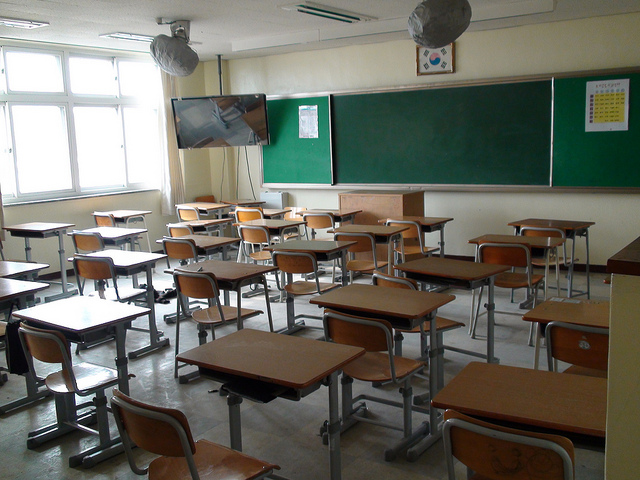- California Assembly OKs highest minimum wage in nation
- S. Korea unveils first graphic cigarette warnings
- US joins with South Korea, Japan in bid to deter North Korea
- LPGA golfer Chun In-gee finally back in action
- S. Korea won’t be top seed in final World Cup qualification round
- US men’s soccer misses 2nd straight Olympics
- US back on track in qualifying with 4-0 win over Guatemala
- High-intensity workout injuries spawn cottage industry
- CDC expands range of Zika mosquitoes into parts of Northeast
- Who knew? ‘The Walking Dead’ is helping families connect
UN urges S. Korea to abolish HIV testing of foreign teachers

High school classroom in South Korea (Courtesy of Schplook via Flickr/Creative Commons)
GENEVA, May 20 (Yonhap) — A United Nations committee on Wednesday reprimanded South Korea’s mandatory HIV testing of native English teachers as discrimination against foreigners, urging the country to abolish the policy.
Foreigners who come to South Korea to teach English are required to have a criminal background check and tests for illegal drugs and the HIV virus, while Korean nationals in equivalent jobs are not required to go through such scrutiny.
The U.N. Committee on the Elimination of Racial Discrimination (CERD) has deliberated the policy after Lisa Griffin, a former English teacher from New Zealand, filed a complaint when her contract with a local education office was not renewed in 2009 over HIV testing.
Griffin, who had received a negative result on the first test, refused to undergo a second, arguing it could stigmatize foreigners as people who have a higher risk of AIDS and could spread a negative sentiment against them.
The Geneva-based committee said the foreigner-only HIV test was “discriminatory and an affront to her dignity,” urging the South Korean government to compensate for “moral and material damages” she suffered.
The mandatory testing “does not appear to be justified on public health grounds or any other ground, and is a breach of the right to work without distinction to race, color, national or ethnic origin,” the committee said in a release.
The U.N. committee urged Korean authorities to take steps to revise the policies that stereotype or stigmatize foreigners, giving them 90 days to report back on the process.















